Herbal Healers I
Agastya
Scientific name : Sesbania grandiflra
Family : Fabaceae
Vernacular name
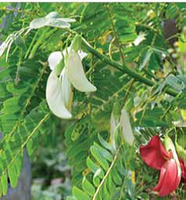 English : West Indian pea, white dragon tree, August flower, Flamingo Bill
English : West Indian pea, white dragon tree, August flower, Flamingo Bill- Hindi : Agastha, Agasti, chogache, gaach-munga, agathiya, sadabasna
- Kannada : Agase, agache, kempagase, chogache, agasi, chogachi, Tamil : Agati
- Malayalam : akatti, aagatti, atti, argatti, akatti, athi, agatti
- Telugu : Avisa, Avishi
- Oriya : Agastee
- Gujarati : Agathiyo,ayathio,agath-thi-nar
- Bengali : Bak, Bagphal, Bak, basnapul, vak, agashi, basna, vasna
Medicinal Uses
- Worm infestation: Intake of agastya leaves juice 10-20ml in empty stomach, early morning for 2 weeks can expel the intestinal worms.
- Headache: 2 -3 drops of agastya leaves juice is used as nasal drops in the morning to cure sinusitis and headache.
- Fever: The paste of agastya leaves can be externally applied over the body to subside the fever.
- Night Blindness: Administration of 3gms of agastya flowers paste processed in ghee recommended for night blindness.
- Colic: 5 grams of agastya bark powder is boiled in 100ml of water till it reduced to 25ml. Oral administration of this decoction added with salt and hing relieve abdominal colic.
- Arthritis: Root and bark paste of agastya is applied externally to relieve pain and inflammation associated with arthritis and gout.
Amalaki
Scientific name : Emblica officinalis
Family : Euphorbiaceae
Vernacular name
- Assamese : Amlaku, Amlakhi, Amlakhu
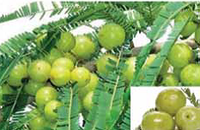
- Bengali : Amla, Dhatri
- English : Emblic Myrobalan
- Gujrati : Ambala, Amala
- Hindi : Amla, Aonla
- Kannada : Nellikayi
- Kashmiri : Embali, Amli
- Malayalam : Nellikka
- Marathi : Anvala, Avalkathi
- Oriya : Anala, Ainla
- Punjabi : Aula, Amla
- Tamil : Nellikkai, Nelli
- Telugu : Usirika
- Urdu : Amla, Amlaj
Medicinal Uses
- Prameha (Diabetes) : Intake of 25ml Amalaki juice added with 3 gms of turmeric powder twice a day before food is useful in prameha, (urinary disorders including Diabetes).
- Rejuvenation: Regular intake of amalaki fruits is recommended for rejuvenation. In retains vitality, increases life span, youthfulness and resistance power.
- Eye diseases: 3 gms of Triphala churna (amalaki, haritaki and vibhitaki, along with honey and ghee is used internally in early morning on empty stomach, beneficial for Eye diseases.
- Laxative: 10-15 gms of Triphala Powder (amalaki, haritaki and vibhethaki) is used internally with hot water after food at night.
- Grey hair: External application of the paste of 50gms henna leaves, 50 gms amalaki, 10 Hibiscus flowers over the scalp and hairs, keep it for 1 hour before taking head bath once or twice a week is beneficial in premature greying hair.
- Amlapitta (Acid peptic disorders): Equal quantity of Amalaki fruits, shatavari root, sugar made into fine powder. Taking 5gms of this mixture along with ghee and honey in early morning on empty stomach for 40 days is beneficial.
Amruta-phalam
Scientific name : Psidium guajava
Family : Myrtaceae
Vernacular name
- Bengali : Goaachhi, peyara
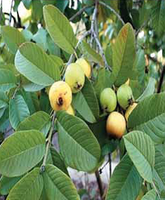
- Gujarati : Jamrud, Jamrukh, Peru
- English : Trade name: Common Guava
- Hindi : Amrood
- Kannada : Gova, Jamaphala, Perala, Sibi, Sebehabbu
- Malayalam : Pera, Koyya
- Marathi : Jamba, Tupkel
- Oriya : Bodojamo, Jamo, Julabojamo, Pijuli
- Tamil : Koyya, Segappugoyya, Sengoyya, Vellaikoyya
- Telugu : Jama
Medicinal Uses
- Diarrhoea: The leaves decoction of guava (one fistful of leaves boiled in 100 ml of water till it reduced to 25 ml) can be given twice daily in Diarrhoea.
- Toothache: The leaves guava can be chewed and this paste can be kept in contact with the teeth for some time. The antiplaque properties of guava leaves are effective in preventing and treating oral problems.
- Vomiting: The bark or roots powder of guava 5gm with honey should be given in case of cholera and vomiting etc.
- Mouth Ulcers: Guava leaves decoction can be used externally for rectal prolapse in children, and used as gargling for chronic ulcers and mouth ulcers.
- Constipation: Guava fruit is nutritious as well as a good Laxative. This fruit is good for Diabetes also.
- Leucorrhoea: Decoction of guava leaves is used as a vaginal and uterine wash, especially in leucorrhoea.
Apamarga
Scientific name : Achyranthes aspera
Family : Amaranthaceae
Vernacular name
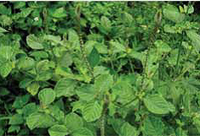 Bengali : Apamg
Bengali : Apamg- English : Prickly Chaff Flower
- Gujarati : Aghedo
- Hindi : Chirchita, Latjira
- Kannada : Uttarani
- Malayalam : Katalati
- Marathi : Aghada
- Punjabi : Puthakanda
- Tamil : Nayuruvi
- Telugu : Uttarenu
- Urdu : Chirchita
Medicinal Uses
- Petechial hemorrhage: The paste red colored apamarga leaves paste is applied over the oedematous lesions, inflamed area and over the petechial parts of the body. This helps to cure is discase within 2-3 days.
- Prameha( Diabetes): 3 gram each of Apamarga seeds and Methi seeds powder is taken early in the morning in empty stomach along with one cup of warm water. This is very effective against diabetes and obesity. This decreases the excessive hunger and thirst.
- Dysmenorrhea: 10gms of whole plant coarse powder is boiled in 200ml of water and till it reduced to 50ml. This filtered decoction consumed 1-2 days prior to expected date of menstruation till it stops. This relieves pain and irregularity of the menses.
- Urirary Calculi: 6-8 twigs of Apamarga soaked in sour buttermilk (100-200 ml) over night. Next day morning it is macerated well, filtered and consumed. This helps to relieve chronic dysuria, recurrent UTI, urinary calculi and gall stones.
- Bleeding disorders: 5-10 ml of leaf juice is mixed with turmeric powder to made fine paste . This paste applied over the bleeding wound to arrest the bleeding immediately.
Aparajita
Scientific name : Clitoria ternatea
Family : Fabaceae
Vernacular name
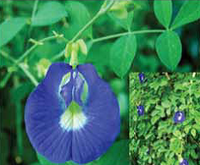 Assamese : Aparajita
Assamese : Aparajita - Bengali : Aparajita
- English : Clitoria
- Gujrati : Gokarni
- Hindi : Aparajita
- Kannada : Girikarnika Balli, Girikarnika
- Malayalam : Shankhapushapam
- Marathi : Gokarna, Aparajita
- Oriya : Aparajita
- Punjabi : Koyal
- Tamil : Kakkanam
- Telugu : Dintena
Medicinal Uses
- Leucoderma: The leaves paste of aparajita applied thickly on the vitiligo patches and expose to sunlight. It has to continue for minimum 1 month to stimulate melanocytes.
- Filarial swelling: 5gms of aparajita root paste should be given internally twice daily in filariasis to relieve the swelling.
- Memory Enhancer: The fresh root paste of aparajita should be given in a dose of 1-3 grams with ghee twice daily for increasing memory and intelligence.
- Menorrhagia: 1 gram of aparajita flowers powder should be given thrice daily with honey for bleeding disorders of uterus.
- Conjunctivitis: The flowers of aparajita are pounded with cow milk and applied over the closed eyes. It alleviates the conjunctivitis
- Toothache: Aparajita root with black pepper should be kept in mouth to pacify the toothache.
- Wound: Fine leaves paste of aparajita should be applied over the wound is beneficial as it has antifungal and anti bacterial properties greatly reduce the infection and heals the wound very fast.
Aragavadha
Scientific name : Cassia fistula
Family : Caesalpiniaceae
Vernacular name
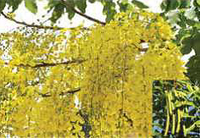 Assamese : Sonaroo
Assamese : Sonaroo - Bengali : Sondala
- English : Indian Laburnum, Purging cassia
- Gujarati : Garamala, Garamalo
- Hindi : Amaltas
- Kannada : Aragvadha, Kakke, Kakke-gida, Kakkernara, Kakkedai, Rajataru
- Kashmiri : Kriyangal Phali
- Malayalam : Konna, Kritamalam
- Marathi : Bahava, Garamala, Amaltas
- Oriya : Sunari
- Punjabi : Amaltas
- Tamil : Sarakonrai, Sarak konnai, Sarak kondi, Sharakkonrai
- Telugu : Rela
- Urdu : Khiyar Shambar
Medicinal Uses
- Eczema: Leaves of aragavadha fine paste applied over the skin lesions once in a day is effective in curing ring worm infection and eczema.
- Worm infestation: 10ml of aragavadha leaves juice is given in empty stomach for 5-6 days helps to relieve intestinal worms effectively.
- Constipation: 15-20gms of aragavadha bark powder cooked in 100ml of water till it reduced to 1/4th. This decoction is orally consumed daily once to relieve constipation, distention of abdomen and chronic diseases due to vitiation of blood.
- Purgative: 3-4 inches of the mature fruit pulp de-seeded and soaked in water overnight . In the morning, this water is taken with little jaggery. This relieves gaseous distention by 2-3 safe purging.
- Jaundice: A fist full of tender leaf buds yellow coloured flowers of aragavadha are taken and soup is made by adding salt, jaggery and pepper. This soup is not only whole some diet and also cures jaundice.
- Jaundice: A fist full of tender leaf buds yellow coloured flowers of aragavadha are taken and soup is made by adding salt, jaggery and pepper. This soup is not only whole some diet and also cures jaundice.
Ardraka
Scientific name : Zingiber officinale
Family : Zingiberaceae
Vernacular name
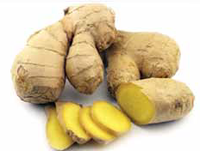 Hindi name : Adarakh (fresh)
Hindi name : Adarakh (fresh) - English : Fresh Ginger
- Kannada : Hasi Shunti, Alla
- Telugu : Allamu
- Bengali : Ada
- Marathi : Aale
- Gujarati : Adu
- Tamil : Inji
- Punjabi : Adi, Adrak
- Malayalam : Inchi
- Urdu : Adrak
Medicinal Uses
- Loss of appetite: Eating slices of ginger sprinkling with salt before meals. It Stimulates digestion, add relish and purifies tongue and throat.
- Diarrhea: A basin is formed around the umbilicus by the paste of black gram and amalaki ( Indian gooseberry) . The naval is filled with fresh ginger juice and retained for 15 to 20min once daily till the diarrhea subsides.
- Earache: Prepare the oil with equal quantity of rocksalt, ginger juice, honey and mustard oil. Put 2 drops in the ear is very effective to cure earache.
- Vomiting: Mix 1 teaspoonful each of ginger juice and lemon juice and consume it several times a day as per the condition.
- Cholera: Mix 2 teaspoonful of grated fresh ginger with 1teaspoonful of honey and consume this mixture 4 times a day to improve digestion in cholera.
- Urticaria: Take 10ml fresh ginger juice with old jaggery twice daily before food till the reduction of swelling and itching.
Arishtaka
Scientific name : Sapindus mukorossi
Family : Sapindaceae
Vernacular name
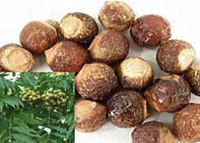 Assamese : Aritha
Assamese : Aritha - English : Indian soapnut
- Hindi : Risht,Rishtak
- Marathi : Phenil,Rinthi,Ritha
- Tamil : Punalai, Punthi, Puvanti
- Malayalam : Cavakkaay,Pasakkottamaram, uruvanchi
- Telugu : Kunkuduchettu,Phenilam
- Kannada : Amtalakaayi, Norekaayi, togate mara
- Bengali : Ritha
- Urdu : Phenil
Medicinal Uses
- Menstrual pain (Dysmenorrhea): The seed of arishtaka (soap nut) has a small white or greenish yellow marrow. 5 seeds marrow paste is administered along with 2 teaspoonful of sesame oil in case of abdominal pain and menstrual pain.
- Food poisoning: 5 seeds are crushed and soaked in 1 litre of water. This water is given to drink in the individuals who are poisoned (internally). This induces vomiting and hence the poisonous effects are reduced.
- Distention of abdomen: The paste of soapnut seed marrow 500-600 mg of is mixed with jaggery and administered internally twice a day.
- Wound: 20gms of fresh bark of arishtaka is boiled with 200ml of water till it reduced to 1/4th. This decoction is used to wash the wounds. The same decoction is used for washing gangrene and get rid of slough, which quickens healing process.
- Eczema: 50 grams of soapnut fresh leaf paste cooked well with 100 ml of sesame oil till the evaporation of moisture. This oil is used to apply over the eczematous lesions.
- Herpes: 100ml of Fresh Soapnut juice in 200ml of ghee is cooked well till complete evaporation of water content. This ghee is applied over the lesions of herpes and chronic itch.
Arjuna
Scientific name : Terminalia arjuna
Family : Combretaceae
Vernacular name
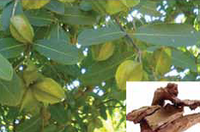 Assamese : Arjun
Assamese : Arjun - Bengali : Arjuna
- English : Arjun tree, Arjunolis myrobalan.
- Gujrati : Sadad, Arjuna, Sajada
- Hindi : Arjuna
- Kannada : Matti, Bilimatti, Neermatti, Mathichakke, Kudare Kivimase
- Malayalam : Nirmasuthu, Vellamaruthi, Kellemasuthu, Mattimora, Torematti
- Marathi : Arjuna, Sadada
- Oriya : Arjuna
- Punjabi : Arjon
- Tamil : Marudam
- Telugu : Maddi
- Urdu : Arjun
Medicinal Uses
- Heart tonic: 5gms of arjuna bark powder boiled in 100ml of milk till it reduce to 50ml . Taking orally this Arjuna milk daily at bed time is very useful in heart diseases.
- Osteoporosis: 10 grams of arjuna bark powder is boiled in 200ml of water till it reduced to ¼ th and filtered. This decoction is consumed along with half a teaspoonful of jaggery and a teaspoonful of honey. This is useful for the treatment of osteoporosis and fatigue caused during old age.
- Hair fall: Mature green leaves of Arjuna are soaked in water for 2-3 hours and macerated well with hands. It yields a mucilagenous mix. It is used for washing the hairs. It is applied over scalp and washed after 30 minutes. This improves shining and quality of hair.
- Wound: Dusting the arjuna bark powder over the wounds / ulcers, is beneficial in fast healing.
- Peripheral neuritis: Equal quantity of Arjuna, Asana (Pterocarpus marsupium) and Bilva (bael tree) barks fine powders mixed well. 3 gms of this mixture is given in empty stomach along with a cup of water for the treatment of peripheral neuritis or numbness.
Ashoka
Scientific name : Saraca indica
Family : Fabaceae
Vernacular name
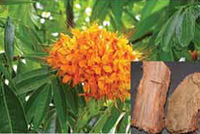 Assamese : Ashoka
Assamese : Ashoka - Bengali : Ashoka
- English : Asok Tree
- Gujrati : Ashoka
- Hindi : Ashoka
- Kannada : Ashokadamara, Ashokamara, Kankalimara
- Kashmiri : Ashok
- Malayalam : Asokam
- Marathi : Ashok
- Oriya : Ashoka
- Punjabi : Asok
- Tamil : Asogam, Asogu, Asokam
- Telugu : Ashokapatta
Medicinal Uses
- Menorrhagia: 10 grams of Ashoka bark is boiled in 200ml of water till it reduced nto ¼ th . This filtered decoction is administered orally twice daily before food. If required, a teaspoon of honey or jaggery can be added to this. It subsides excessive bleeding during menses.
- Irregular periods: Equal quantity of Ashoka, Yashtimadhu, Lajjalu powders are taken. 10gms of this mixure boiled in 200ml of water till it reduced to ¼ th . This filtered decoction consumed 3-5 days prior to the date of periods and continued till 10 days after periods twice daily.
- Wound: Ashoka bark decoction is prepared and used for washing the wounds and non healing ulcers.
- Mouth ulcers: One fistfull of Ashoka flowers and half fist of coconut pulp are taken and churned well in mixer grinder. To this, as per taste, salt, black pepper, curry leaves and coriander can be added. This recipe is very useful in treating gastritis, mouth ulcers, GERD.
- Leucorrhoea: Equal quantity of Ashoka bark, Amalaki fruit and Nagakesar powders are mixed well. 1-2 gram of this powder is mixed with a cup of rice washed with water or sweet buttermilk and administered twice daily. This pacifies leucorrhea very effectively.
Source: Ayurveda offering Herbal healing
Last Modified : 2/12/2020
Provides information on health benefits of Amla
